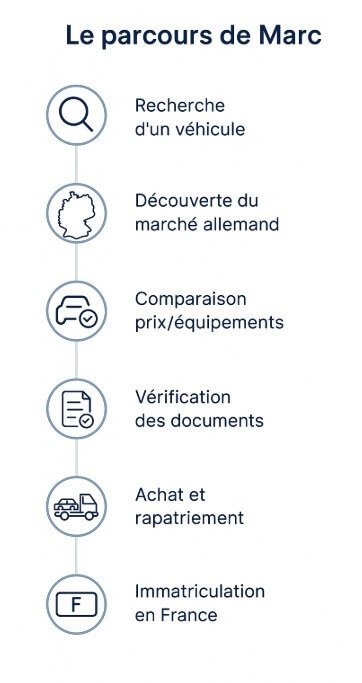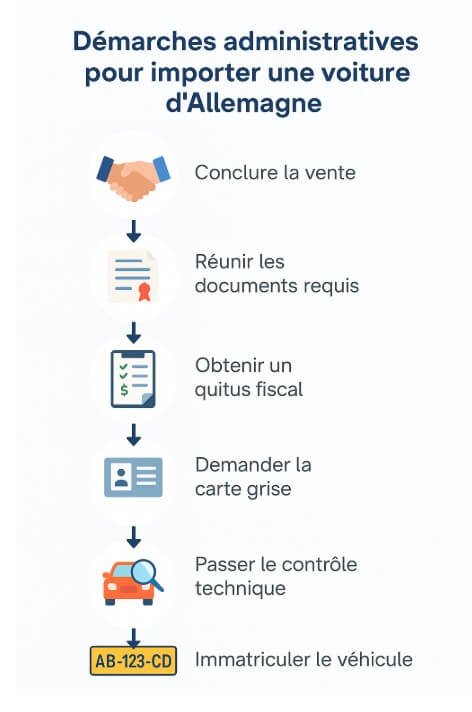Why Buy a Used Car in Germany? The Benefits Explained
Marc is 38 years old, lives in Lyon, and is looking to replace his car. His budget: €18,000. He wants a comfortable, reliable, well-equipped model with low mileage. But the more he explores the ads around his hometown, the more he realizes that what he finds falls far short of his expectations. The cars are either too expensive, too driven, or lacking in options.
Little by little, an idea takes hold: what if the solution lies abroad? Germany, renowned for its dynamic car market, often comes up in discussions. Marc begins to ask himself questions. Why are cars cheaper there? Are they really better maintained? Is it complicated to bring a vehicle back? And above all, is it really worth it?
He decides to dig deeper into the subject—and discovers that buying a used car in Germany can have many advantages. Here’s what he learns during his research. 🏆 The main reasons to buy a used car in Germany
🔧 Better-maintained vehicles

When comparing several listings, Marc quickly noticed a recurring point: German cars almost always display a clear service history. Stamped logbook, retained invoices, regular maintenance… German drivers seem particularly attentive to maintaining their vehicles.
Another reassuring detail: the technical inspection is reputed to be much stricter than in France. As a result, the vehicles offered for sale are often in better overall condition, and hidden defects are rarer. For Marc, who wants to avoid unpleasant surprises, this is a real plus.
🚗 A much wider selection
As he broadened his search, Marc was struck by the number of listings available. For the same model, he found three to four times more versions in Germany than in France. Better still, the configurations were often richer. High-end finishes, leather upholstery, technological options, various engines… There was plenty to compare and choose from.
The German market being larger, it naturally offered more opportunities. And this allowed Marc to find rare or better-equipped models, often unavailable within his budget in France.
💰 More attractive prices
What finally convinced Marc were the prices. For equivalent mileage and equipment, German cars were regularly 15 to 20% cheaper. A significant difference, especially when looking for good value for money. Model
Price in Germany
| Price in France | Estimated savings | Audi A4 Avant 2.0 TDI (2024) | €28,000 |
|---|---|---|---|
| €32,000 | €4,000 | BMW 3 Series Touring 320d M Sport | €35,000 |
| €38,000 | €3,000 | Audi Q5 2.0 TDI quattro (2024) | €40,000 |
| €44,000 | €4,000 | He compares several models to get a more precise idea: | A 2024 Audi A4 Avant 2.0 TDI 150 S tronic |
with around 20,000 km on the clock is priced at €28,000 in Germany, compared to €32,000 in France. A
- BMW 3 Series Touring 320d M Sport with an 8-speed automatic transmission and 25,000 km on the odometer costs €35,000 in Germany, compared to €38,000 in France. A 2024 Audi Q5 2.0 TDI quattro S tronic with 30,000 km on the odometer costs €40,000 in Germany, compared to €44,000 in France.Marc realizes he could save between €3,000 and €4,000 depending on the model, without sacrificing any quality. And in some cases, he could even aim for a higher trim level or a more powerful engine while staying within his initial budget. These differences can be explained in particular by a much larger German market, faster vehicle turnover, and a different automotive culture. Competition between sellers is fiercer there, which drives prices down, even for premium brands.🌍 A transparent and structured market
- Marc also discovered that the sales process is often more regulated. Sellers—whether private individuals or professionals—generally provide comprehensive documentation: maintenance history, technical reports, and precise details on the vehicle’s condition. This transparency facilitates decision-making while reducing risks. This doesn’t mean there are no pitfalls, but warning signs are easier to spot when you have the right information at hand.🗓️ How to buy a car safely in Germany Marc is now convinced: the German market offers more choice, better prices, and often better-maintained vehicles. But he doesn’t want to do just anything. He therefore begins to seriously research how to secure his purchase, as buying remotely or abroad inevitably raises some doubts.📉 Documents to check Before even thinking about booking a train ticket or contacting a seller, Marc lists the essential documents to obtain to ensure the car is in good standing and can be imported:The maintenance booklet
- : to verify that all maintenance has been performed regularly. The technical inspection: mandatory if the car is more than 3 years old, it gives a good idea of the vehicle’s condition. The German registration document, in two parts: Part I (small format, for daily use) and Part II (ownership document). A European certificate of conformity, essential for registering the vehicle in France.
Maintenance invoices
, or any other proof of mechanical monitoring.
Marc quickly learned that missing any of these elements could slow down or even block registration in France. He therefore decided to only consider vehicles for which these documents were available.
🧭 Buying on his own or using a professional?
Marc hesitated: should he organize everything himself, or hire a professional or specialized agent?
Buying on his own could be a little cheaper, but it requires speaking at least a little German, understanding the regulations, being able to travel, and being able to spot a scam.
Using a French professional specializing in imports allows you to delegate the checks, negotiations, administrative procedures, and even the transport and warranty. The cost is a little higher, but the time savings and security can be worth it, especially for a first-time buyer.
Marc weighs the pros and cons based on his level of confidence, his availability, and his desire to embark on the adventure himself. 📌 Pitfalls to Avoid When Buying in Germany
Even though the German market is reputed to be reputable, Marc knows he must remain vigilant. As everywhere, there are unscrupulous sellers, faked cars, and questionable documents.
- ⚠️ Common Scams Several risks exist, and Marc prefers to anticipate them:
- Tampered Odometers : Some vehicles display lower mileage than the actual mileage. Marc learns to check the consistency between visible wear (pedals, steering wheel, upholstery) and the indicated mileage.
- Restored Damaged Vehicles: Sometimes, a significant dent has been hidden. A trained eye or a thorough technical inspection can make the difference.
- Fake Ads: Prices too low, difficult contact, requests for advance payment… these are all warning signs.
- 🛡️ How to Protect Yourself EffectivelyTo avoid unpleasant surprises, Marc applies a few simple principles:
He favors professional sellers or individuals with a good history.
He always requests all documents before visiting.
He arranges, if possible, an on-site appraisal or an additional technical inspection.
And above all, he doesn’t pay any deposit before inspecting the vehicle himself.
This rigor allows him to filter out questionable listings and focus on serious opportunities.
🚗 What steps do I need to take to repatriate a German car?
Marc has finally found the ideal car. It ticks all the boxes: well-maintained, well-equipped, and within his budget. Now it’s time to tackle the more technical part: repatriating the vehicle to France and registering it. Here’s what he discovered along the way. 📋 Administrative steps
Sign the sales contract
: Marc checks that all the information is correct (mileage, chassis number, price, seller’s contact details).
Collect all documents: German registration document (Part I and II), certificate of conformity, maintenance log, technical inspection, etc.
- Obtain a certificate of transfer and an invoice: essential to prove the transaction. Repatriate the car: either by road with German temporary export plates (Kurzzeitkennzeichen or Zollkennzeichen), or by carrier.
- Request a tax clearance certificate: At your tax office in France, to prove that VAT has been paid (or not due).
- Submit your French technical inspection: If the car is more than 4 years old.
Register in France:
via ANTS, providing all supporting documents. 💸 Expected costs
- Marc sets a small budget to avoid unpleasant surprises:
- Registration certificate
- : depends on the taxable horsepower, the department, and the bonus/penalty. Tax clearance certificate : free, but essential.
- Certificate of conformity
: sometimes provided, otherwise between €100 and €300.
German temporary plates + insurance
: between €100 and €300. Transport (if not repatriated by road): between €500 and €1,000 depending on the distance.Technical inspection in France: around €80.

Despite these costs, Marc finds that his purchase remains
- significantly more advantageous than an equivalent car purchased in France. And above all, he knows exactly what he’s buying.
- ✅ Can I benefit from the manufacturer’s warranty when buying in Germany? Yes, provided the car is still under warranty and that it is valid throughout Europe. Check the conditions carefully on the service booklet or with the manufacturer.
- 💸 Do I have to pay import VAT? If the vehicle is less than 6 months old or has less than 6,000 km, VAT is due in France, even if it has already been paid in Germany. Otherwise, no additional charge is due. 🚙 Can I drive the imported car immediately?
- Yes, if you have German temporary plates with insurance or a French WW temporary registration. Otherwise, the vehicle must remain immobilized until the final registration is obtained. 📄 How long does it take to obtain the French registration card?
- Once all the documents are gathered, the ANTS (French National Office for the Registration of Vehicles) issues the registration card within 7 to 15 business days on average. 🔧 Can I have my German car serviced in a garage in France?
- Absolutely. Manufacturers have European networks. It is even possible to claim a manufacturer’s warranty or extend the warranty in certain cases. ✅ Conclusion After several weeks of research, comparison, and reflection, Marc found his ideal car in Germany. Between the better overall condition of the vehicles, the often more attractive prices, the wider selection, and the reassuring administrative rigor, the investment was clearly worth the effort.
- With the right documents, the right reflexes, and a little preparation, buying a car in Germany is not a complicated process. And like Marc, many French buyers are now turning to this dynamic market to make a smarter purchase.

Common mistakes to avoid when buying a van
While the van conversion craze is still in full swing in 2025, many are embarking on the adventure with the desire for everything to run smoothly. But beware: buying a van, as exciting as it may be, is full of…

Find out why the Benimar Model 61 Mercedes 2.2L CDI will change your travel experience forever!
When it comes to unforgettable road trips, the importance of choosing the right recreational vehicle cannot be underestimated. This is where the Benimar Model 61 comes in, a premium caravan paired with the excellence of the Mercedes 2.2L CDI. Together,…

Discover the iconic history of the Citroën Dolly 2CV
The Citroën Dolly 2CV, an emblematic symbol of the French automobile, has spanned the decades with indisputable notoriety. Born in a difficult context after the Second World War, this car was designed to motorize a population seeking accessibility and simplicity.…






